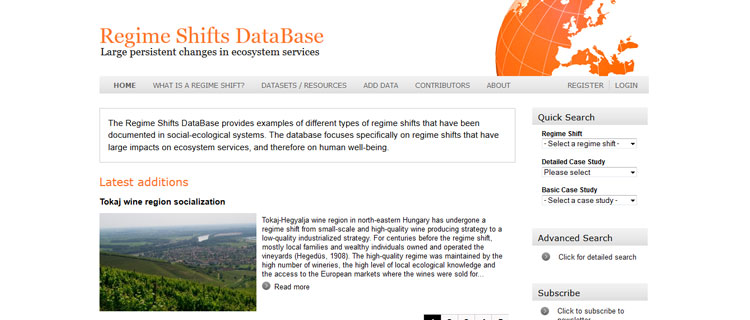
Regime shifts
Introducing the Regime Shifts Database
New online resource with detailed examples of large persistent changes in nature
- Regime shifts are large, persistent changes in the structure and function of social-ecological systems, with substantive impacts on ecosystem service
- Online database provides researchers, practitioners and students with an extensive portfolio of different examples of regime shifts
- Better understanding of regime shifts is important as they may have substantial impacts on human economies, societies and well-being
What do coastal marine eutrophication, West Antarctic ice sheet collapse and bush encroachment have in common? They are all considered to be regime shifts, or large, persistent changes in the structure and function of social-ecological systems, with substantive impacts on the suite of ecosystem services provided by these systems.
Or think of a regime shift like a stock market collapse: large, abrupt and heavy on the wallet. The collapse of Canada's Newfoundland cod fishery in the early 1990s directly affected the livelihoods of some 35,000 fisherman and fish processing plant workers, and led to a decline of over $200 million dollars per annum in cod landing revenues.
Extensive portfolio
However, there is one fundamental difference between the stock market and a social-ecological regime shift. Where stock markets usually bounce back, regime shifts cause long-lasting changes to ecosystems and the societies that live in them.
Furthermore, regime shifts are notoriously difficult to predict. They often come as a surprise, and by the time society realizes what is happening, it is often too late or too costly to reverse.
A new online database provides researchers, practitioners and students with an extensive portfolio of different examples of regime shifts that have large impacts on ecosystem services and human well-being. Each example is accompanied by an in-depth description how the regime shifts works, the impacts it has, and how managers can build resilience to the shift.
Substantial impact
The website, www.regimeshifts.org, is a product of the Regime Shifts theme at the centre and the idea of researcher Oonsie Biggs and Garry Peterson.
"Better understanding of regime shifts is important as they may have substantial impacts on human economies, societies and well-being," Oonsie Biggs says.
The website is based on a participatory approach where users of the website can contribute or suggest their own examples of regime shifts for inclusion in the database.
"By collecting a wide range of examples of regime shifts, we can better understand how the drivers and impacts of regime shifts vary in different contexts, and more importantly, potentially identify new types of regime shifts."
The Regime Shifts DataBase provides examples of different types of regime shifts that have been documented in social-ecological systems.
The database focuses specifically on regime shifts that have large
impacts on ecosystem services, and therefore on human well-being.
Go to www.regimeshifts.org






